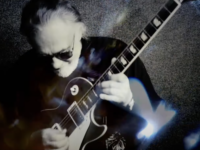In our first encounter with saxophonist Jacques Schwarz-Bart, we came across his then-new album Abyss (2009), of which I wrote at the time “successfully melds modern jazz and soul shapes with the riveting rhythms and spiritual character of the Caribbean and Africa.” I mean “our” and “we’ in the literal sense this time, with this record getting a second thumbs-up from SER cohort Mark Saleski. Since then, Schwarz-Bart has made a R&B inflected funk-jazz record Rise Above (2010) that featured a lot of vocal tracks, so we hung back until this diversely inclined artist came back to our wheelhouse again, and this year he did, in a big way.
The Art of Dreaming is a long-awaited return to the acoustic, small combo format Schwarz-Bart started with on his 1999 debut Immersion, but enriched by his experiences since then as a composer, bandleader and performing artist. And that stands for a lot, since his rapid growth and maturity has put him in a spot where he’s far beyond copying his influences and has crafted a style of his own, one that applies his French Guadaloupean birthright and a love for both American soul and, of course, American jazz. Those are the things Schwarz-Bart brings to the traditional setting, making it not quite just any jazz quartet outing.
To emphasize that this quartet-made music, the album is credited accordingly to the Jacques Schwarz-Bart Quartet, and the leader has surrounded himself with musicians whose experiences in playing for major jazz artists match his own: Baptiste Trotignon, piano; Thomas Bramerie, acoustic bass; and Hans Van Oosterhout, drums. Trotignon and Bramerie also contributed six of the ten songs to these sessions (Schwarz-Bart composed the rest).
An ensemble’s collective spirit gives the album conformity and consistency, but the tenor saxophone of Schwarz-Bart remains the character of this record. That’s the main appeal you hear in a song like “Blues Jonjon,” where Schwarz-bar plays it so smooth up in the higher reaches of his register and his funky, buttery delivery draws much from Eddie Harris, but is largely free of cliché. Such a delivery can be found also on “Now,” a soft-toned soul poem that evolves into a mid-tempo, Keith Jarrett type groove. “Peyotl” (YouTube above) is the set’s funkiest tune, even though that beat keeps changing tempo. Meanwhile, the chord changes persist, keeping things coherent. Alternating rhythms are the order of the day for “Massassoit” as well, and set to a snappy, Corea-esque kind of melody.
Schwarz-Bart and his band play songs clearly influenced by heroes from the 60s, but with a modernized twist to them. “It’s Pain” and “Voir” float along spiritually like a Coltrane or Pharaoh Sanders song, but he plays not quite like either of those guys. “Lullaby From Atlantis” is a lavish ballad in the searching, Wayne Shorter way (and Schwarz-Bart’s saxophone does evoke Shorter, too). While Dreaming doesn’t show off his Caribbean roots as prior records have, it’s present here, especially on “Emile,” where the island rhythm constructed by Bramerie and Van Oosterhout percolate as Schwarz-Bart and Bramerie stroll airily above them.
Arrangements are stripped bare on “Dlo Pann,” a duet between Schwarz-Bart and Trotignon that’s set to straightforward pulse and a complex by catchy strain. Schwarz-Bart’s playing is harmonically pleasing here, whether he’s leaning toward improvising or just the harmony.
The grand design employed by Jacques Schwarz-Bart and his quartet is in most aspects much different that the approach he took on Abyss, but the appeal of this album matches the one of the prior one. Which is to say, it’s very, very appealing. The Art of Dreaming lives up to its title, because the foursome never feels as if they are overthinking their art, they are, in the leader’s own words, “dreaming while being awake,” and their alert but relaxed state puts me in that same mood.
The Art of Dreaming was released on September 25 by Naïve Records. Visit Jacques Schwarz-Bart’s webiste for more info.
[amazon_enhanced asin=”B007K3TO70″ /] [amazon_enhanced asin=”B002QK00VQ” /] [amazon_enhanced asin=”B000TLUFEG” /] [amazon_enhanced asin=”B003TTZTZA” /] [amazon_enhanced asin=”B0000259GF” /]
- James Brandon Lewis Quartet – ‘Abstraction Is Deliverance’ (2025) - May 27, 2025
- Soft Machine – ‘Drop’ (1971, 2025 remaster) - May 21, 2025
- Marshall Allen’s Ghost Horizons – ‘Live In Philadelphia’ (2025) - May 19, 2025




